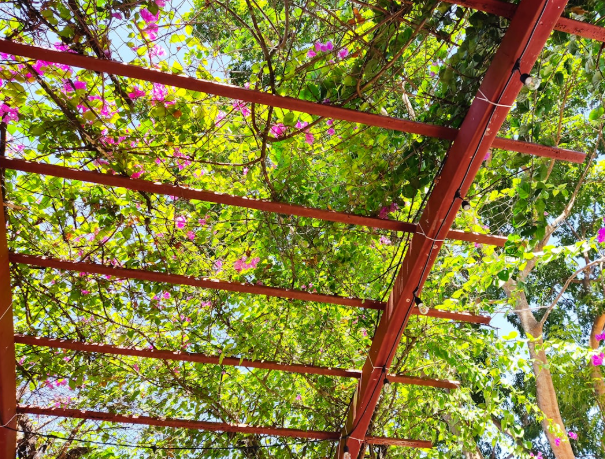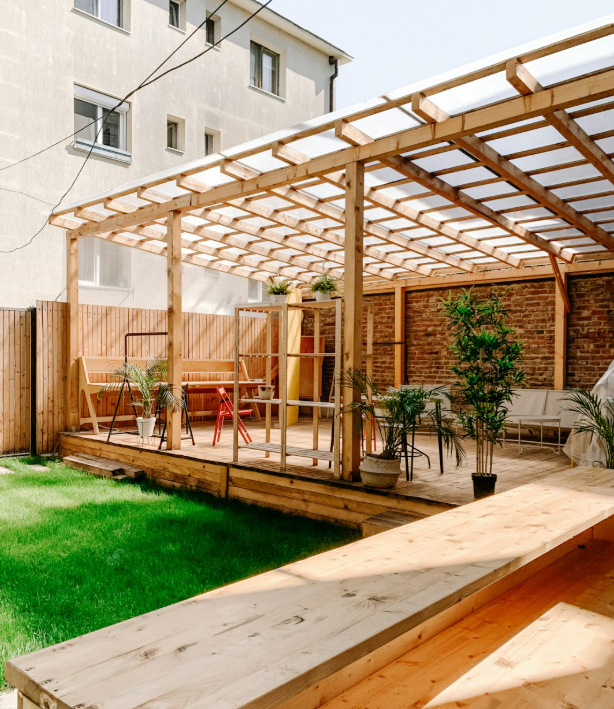Choosing the right outdoor structure can significantly enhance the beauty and functionality of your home, especially in Fort Worth, where outdoor living is a cherished part of the lifestyle. When it comes to pergolas and arbors, understanding the distinct features and benefits of each can help you make an informed decision that complements your space. Pergolas in Fort Worth offer open, airy designs that provide shade and an elegant framework for climbing plants, while arbors near me typically feature seating and roofs, creating intimate garden entryways. With expert advice and insights from the American Society of Landscape Architects, Fort Worth homeowners can confidently select the best materials and designs that suit their needs. Whether you’re looking to boost property value or simply enjoy more time in your backyard, Texas outdoor living solutions offer endless possibilities.
Pergolas and arbors are popular outdoor structures that can transform your Fort Worth home’s exterior. Let’s explore their key differences, benefits, and popular design styles to help you make an informed decision for your outdoor space.
Key Differences Explained
Pergolas and arbors serve different purposes in outdoor design. Pergolas are larger structures that create defined outdoor living areas, while arbors are smaller and often used as entryways or focal points in gardens.
Pergolas typically feature an open roof design with beams or lattice work, providing partial shade and support for climbing plants. They’re ideal for creating outdoor rooms or covering patios.
Arbors, on the other hand, are usually arched or square-topped structures with a more enclosed feel. They’re perfect for framing garden paths or creating intimate seating areas.
Benefits of Outdoor Structures
Adding a pergola or arbor to your Fort Worth home can bring numerous advantages to your outdoor living experience.
These structures provide a balance of sun and shade, making your outdoor space more comfortable throughout the day. They also offer support for climbing plants, allowing you to incorporate more greenery into your landscape design.
Pergolas and arbors can define specific areas in your yard, creating visual interest and improving the overall aesthetics of your property. They also provide a sense of privacy and can serve as a backdrop for outdoor entertaining.
Additionally, these structures can increase your home’s value by enhancing its curb appeal and expanding usable outdoor living space.
Popular Design Styles
When it comes to pergolas and arbors, there are various design styles to suit different architectural preferences and landscape designs.
Traditional styles often feature classic wood construction with ornate details, complementing colonial or craftsman-style homes. Modern designs may incorporate sleek lines and materials like metal or composite for a contemporary look.
Rustic pergolas and arbors use natural materials and rough-hewn finishes, perfect for creating a cozy, cabin-like atmosphere. Mediterranean-inspired designs often include arched openings and terracotta accents.
For inspiration, check out these stunning pergola designs on Pinterest. Remember to choose a style that complements your home’s architecture and your personal taste.
Finding Quality Pergolas in Fort Worth
When searching for the perfect pergola for your Fort Worth home, it’s essential to consider local suppliers, installation tips, and proper maintenance to ensure long-lasting enjoyment of your outdoor structure.
Trusted Local Suppliers

Finding a reputable supplier for pergolas in Fort Worth is crucial to ensure quality materials and craftsmanship. Look for companies with a strong local presence and positive customer reviews.
Ask potential suppliers about their experience with Fort Worth’s climate and building codes. A knowledgeable supplier can guide you through the selection process and offer custom solutions.
Consider visiting showrooms or completed projects to see the quality of materials and workmanship firsthand. Don’t hesitate to ask for references from previous customers in the Fort Worth area.
Installation Tips for Fort Worth Homes
Proper installation is key to ensuring your pergola withstands Fort Worth’s weather conditions and provides lasting enjoyment. Here are some tips to keep in mind:
- Obtain necessary permits from the City of Fort Worth before beginning installation.
- Choose a level area with good drainage to prevent water accumulation.
- Use weather-resistant materials and hardware suitable for Texas climate.
- Ensure proper anchoring to withstand strong winds common in the area.
- Consider professional installation for complex designs or if you’re unsure about DIY methods.
Maintenance and Care
Regular maintenance will keep your pergola looking great and extend its lifespan in Fort Worth’s climate.
Clean your pergola annually with a mild detergent and water solution to remove dirt and debris. Inspect for any loose hardware or signs of wear, tightening or replacing components as needed.
For wooden pergolas, apply a protective sealant every 2-3 years to guard against moisture and UV damage. Metal structures may require touch-up paint to prevent rust.
Trim any climbing plants regularly to prevent overgrowth that could damage the structure. Remove debris from the roof area to maintain proper drainage and prevent moisture buildup.
Choosing the Right Materials

Selecting the appropriate materials for your pergola is crucial for its longevity and appearance in Fort Worth’s unique climate. Let’s explore the best options and considerations for your outdoor structure.
Best Pergola Materials for Texas
When choosing materials for pergolas in Fort Worth, durability and weather resistance are key factors to consider.
Cedar and redwood are popular choices due to their natural resistance to decay and insects. These woods also withstand Texas heat well and develop a beautiful patina over time.
For a low-maintenance option, consider composite materials that mimic the look of wood without the need for regular staining or sealing. These materials are resistant to fading, warping, and insect damage.
Aluminum pergolas offer excellent durability and require minimal maintenance, making them ideal for withstanding Fort Worth’s varied weather conditions.
Comparing Wood and Metal Options
Here’s a comparison of wood and metal options for pergolas:
| Material | Pros | Cons |
| Wood | Natural look, customizable, affordable | Requires regular maintenance, can warp or rot |
| Metal | Durable, low maintenance, weather-resistant | Can be more expensive, limited design options |
Wood pergolas offer a classic, warm appearance and can be easily customized. However, they require regular maintenance to prevent weather damage.
Metal pergolas, particularly aluminum, are highly durable and require little upkeep. They’re resistant to rust and can withstand harsh weather conditions, but may have fewer design options compared to wood.
Weather Considerations for Durability
Fort Worth’s climate presents unique challenges for outdoor structures. Consider these weather factors when choosing pergola materials:
- Hot summers: Select materials that won’t warp or fade in intense heat and sunlight.
- Occasional freezes: Ensure your chosen material can withstand temperature fluctuations without cracking.
- Strong winds: Opt for sturdy materials and proper anchoring to prevent damage during storms.
- High humidity: Choose materials resistant to moisture to prevent rot and mold growth.
By selecting materials suited to Fort Worth’s climate, you’ll ensure your pergola remains beautiful and functional for years to come.
Enhancing Property Value
Adding a pergola to your Fort Worth home can significantly boost its value and appeal. Let’s explore the benefits, design standards, and success stories associated with these outdoor structures.
Home Improvement Benefits
Incorporating a pergola into your outdoor space can yield numerous benefits that enhance your property’s value.
Pergolas create additional living space, effectively expanding your home’s usable square footage. This added outdoor room can be a significant selling point for potential buyers.
These structures also improve curb appeal, giving your home a more polished and inviting appearance from the street. A well-designed pergola can set your property apart in the competitive Fort Worth real estate market.
Energy efficiency is another benefit, as pergolas provide shade that can help reduce cooling costs during hot Texas summers.
Expert Design Standards
The American Society of Landscape Architects recommends following these design standards for pergolas:
- Scale: Ensure the pergola’s size complements your home and yard without overwhelming the space.
- Proportion: Maintain a balanced ratio between the pergola’s height, width, and depth.
- Materials: Choose high-quality, weather-resistant materials that match your home’s style.
- Functionality: Design the pergola to serve its intended purpose, whether for shade, entertaining, or supporting plants.
- Integration: Seamlessly blend the pergola with existing landscaping and architectural elements.
Adhering to these standards will result in a pergola that not only looks great but also adds maximum value to your property.
Case Studies and Success Stories
Real estate professionals in Fort Worth have reported positive impacts of pergolas on home values. Here are some key findings:
- A study of 50 Fort Worth homes found that those with pergolas sold for an average of 7% more than comparable homes without.
- One Fort Worth family reported a 150% return on investment after adding a custom cedar pergola to their backyard.
- A local realtor noted that homes with well-designed outdoor living spaces, including pergolas, typically spend 30% less time on the market.
These success stories demonstrate the tangible value that a thoughtfully designed pergola can add to your Fort Worth home.
Frequently Asked Questions
To help Fort Worth homeowners make informed decisions about pergolas and arbors, we’ve compiled answers to some common questions.
Pergola vs. Arbor: A Comparison
Pergolas and arbors serve different purposes in landscape design. Here’s a quick comparison:
- Size: Pergolas are typically larger, creating outdoor rooms. Arbors are smaller, often used as entryways.
- Structure: Pergolas have an open roof with beams. Arbors usually have a more enclosed, arched top.
- Function: Pergolas define larger spaces for seating or dining. Arbors frame pathways or create small seating nooks.
- Plant support: Both support climbing plants, but pergolas offer more extensive coverage.
Choose based on your specific needs and the available space in your Fort Worth yard.
Selecting Wood for Texas Conditions
When choosing wood for outdoor structures in Texas, consider these options:
- Cedar: Naturally resistant to decay and insects, ideal for Texas climate.
- Redwood: Durable and weather-resistant, but more expensive.
- Pressure-treated pine: Affordable and treated to resist rot, but may require more maintenance.
For best results in Fort Worth’s climate, opt for cedar or redwood if budget allows. These woods withstand heat and humidity well while providing natural beauty.
Common Installation Questions
Here are answers to frequently asked installation questions:
- Do I need a permit? Yes, Fort Worth typically requires permits for pergolas. Check with the city’s building department for specific requirements.
- How deep should support posts be? Generally, posts should be buried at least 1/3 of their above-ground height, with a minimum depth of 2 feet.
- Can I install a pergola myself? While DIY is possible for simple designs, professional installation is recommended for complex structures or if you’re unsure about the process.
- How long does installation take? Professional installation usually takes 1-3 days, depending on the pergola’s size and complexity.
- Can pergolas be attached to my house? Yes, but this requires careful planning and may need additional permits. Consult a professional for proper attachment methods.

